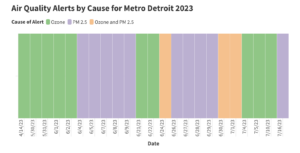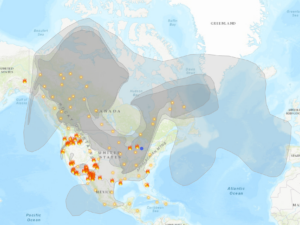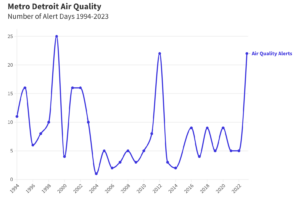
This article was republished here with permission from Planet Detroit.
By Nina Ignaczak, Planet Detroit
As Michigan deals with periodic wildfire smoke drifting across its borders, the Michigan Department of Environment, Great Lakes and Energy has a new advisory protocol to inform the public about resulting poor air quality.
Until this year, the agency had only ever issued such advisories for ozone, commonly called “Ozone Action Days.”
But on June 4, in response to the first wave of wildfire smoke that drove Michigan’s air quality index into the unhealthy range, EGLE issued its first-ever air quality alert based on PM2.5 (particulate matter).
“This is the first year we have had to call Action Days/Alerts for PM2.5 due to Canadian wildfire smoke impacting our state,” EGLE meteorologist Alec Kownacki told Planet Detroit.
He said the department is updating its website to reflect Air Quality Alerts for both ozone and PM-2.5.

Source: Michigan Department of Environment, Great Lakes and Energy
Large-scale wildfires produce significant smoke that can affect air quality, reducing visibility and causing haze and potential health concerns. Inhalation of fine particulate matter can irritate the respiratory system, particularly for individuals with pre-existing respiratory conditions, the elderly, and young children.

Smoke plume extent captured from airnow.gov on Sunday, July 17 at 7:11 p.m.
Metro Detroit has experienced more than 22 summer days this year so far with an air quality index of unhealthy or worse.
“This year has been one for the record books regarding air quality alerts,” Kownacki said.
Of the 23 alerts issued by EGLE in 2023 for metro Detroit, 13 have involved ozone, more than has occurred in a single year since 2012. EGLE issued its earliest-ever ozone alert on April 15, 2023.

Source: EGLE • Note: All action alerts until 2023 are related to Ozone. In 2023, 13 of 22 alerts are related to ozone with the remainder related to PM 2.5 only.
The spike in alert days related to ozone follows the U.S. Environmental Protection Agency’s May determination that southeast Michigan has successfully met all federal standards for ground-level Ozone under the federal Clean Air Act. The region was previously designated as a “non-attainment” area for Ozone in 2018.
The decision followed EGLE’s request to the EPA to discount certain air quality data measured on June 24 and 25, 2022, due to the influence of wildfire smoke. By discounting this data, the region’s overall air quality measurements fell below the National Ambient Air Quality Standards for ozone.
So far in 2023, the air monitor at which EPA agreed to discount data for its determination has met or exceeded the ozone standard of 70 ppb on 22 days; two in April, six in May, nine in June, and five in July. The monitor is located on East 7 Mile in Detroit. In 2022, that monitor had eight exceedances between April and August.
Jettisoning the nonattainment status could make the region more competitive in attracting industry, an EGLE spokesperson told the Detroit News, noting that non-attainment status would amount to a “no growth policy” for the region.
However, given the increase in alert days related to ozone, regulators and advocates are watching to see what’s next.
“The EPA has significant discretion in determining whether or not to pursue redesignation,” Nick Leonard, executive director of the advocacy organization Great Lakes Environmental Law Center, told the Detroit News. But he noted that the EPA had “made it fairly clear” that it would rely on contingency measures to be implemented by EGLE should ozone pollution levels rise above the standard, rather than pursue redesignation.
“I’m not aware of a mechanism to reverse the EPA’s decision to put southeast Michigan back in attainment, but certainly increases in ozone exceedances would impact the next decision point on attainment,” EGLE spokesperson Hugh McDiarmid told Planet Detroit.
“Michigan, as well as many other states, will be very interested in whether EPA makes changes in rules pertaining to pollutants like ozone and particulate matter in response to the wildfire situation,” he added.
Catch more news at Great Lakes Now:
DTE agrees to shut down coal-fired Monroe plant in 2032, three years ahead of schedule
What does the Supreme Court’s wetland ruling mean for Michigan?
Featured image: Haze fills a summer Detroit sky above Belle Isle. (Photo courtesy Amy Sacka)
1 Comment
-
“Canadian wildfires spark urgent action as state reevaluates air quality alerts amid record-breaking air pollution.”




